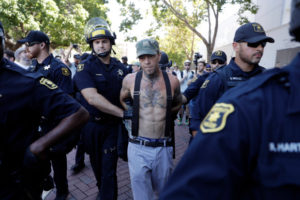5 Ways to Safely Protest:
Knowing what is allowed and what isn’t will be beneficial in decision making. According to the American Civil Liberties Union, your rights include free speech, but this doesn’t include libel, slander, obscenity, threats, or speech that incites violence or law-breaking.
2. Leave when others are participating in illegal activities.
You could land in legal trouble, and your safety could be at risk if you stay in an area of violence. While public schools cannot legally force you to stay in school, there may be consequences for missing class. Unexcused absences, docked grades or suspensions could be handed out if students choose to join the walkout.
3. Follow the lawful instructions of a police officer.
It’s against the law to disobey a lawful order made by a police officer. However, if you feel like your rights have been violated by a policeman, you can file a complaint with the with the agency’s civilian complaint board.

4. Refrain from saying anything that will cause others to commit violent acts.
Provoking others in a negative way can result in more violence, leading to more serious problems. Arrest, injury, and death are possible consequences people face for engaging in violent acts during a protest.
5. Back away from violence, and do not get in the way of others to ensure your own safety.
Don’t get involved in aggressive fights or any type of violence. This puts your well-being at risk, and can put you in great legal trouble. Some protest can get very violent, such as the White-Nationalist Rally in Virginia, where three people were killed.












